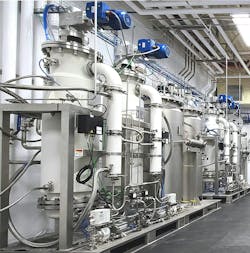Red Mesa Hits Hemp Refining with Chemical Industry Rigor
Three Key Takeaways
- Red Mesa Science and Refining has adapted to the challenging hemp industry by focusing on refining, investing in liquid chromatography and developing a new botanical refining method that isolates cannabinoids without chemical conversions.
- The hemp supply chain is complex, with multiple intermediaries driving up costs. Red Mesa is addressing this by building direct relationships with farmers across different regions and leveraging a diverse team with expertise in cultivation and industrial operations.
- The company is applying mature commercial industry practices from sectors like chemical processing, while remaining adaptable to rapidly changing regulatory environments and technological innovations in the hemp industry.
Hemp has a storied history in the United States. A high-strength fiber, hemp was once a common material found in clothing, rope and sails until the Marihuana Tax Act of 1937 declared it illegal.
The loosening of the nation’s cannabis laws has led to an influx of hemp-derived products aimed at the wellness market. The extractors and refiners who bring these products to market are similar in many ways to the traditional chemical industry, from the equipment they use to the processes they employ. And like the chemical industry, they also face regulatory uncertainty and supply chain challenges.
Red Mesa Science and Refining, a hemp refinery based in St. George, Utah, has been navigating the choppy waters of the hemp industry since its founding in 2019. The company manufactures and distributes industrial-scale hemp compounds, including CBD, CBG, CBN and other cannabinoid raw materials, at its 50,000-square-foot facility.
Regulatory uncertainty in the hemp products market and rapid market changes demand constant vigilance and strategic adaptability. Over the course of its short history, Red Mesa has retooled its strategy and made significant capital investments to remain competitive.
On Oct. 22, the company announced a new botanical refinement method that isolates cannabinoids without using chemically catalyzed conversions. This was a necessary step for the company as some state regulators look to restrict the use of conversion reactions in hemp refining.
The botanical refinement process involves the extraction and distillation of cannabinoids from U.S.-grown hemp and introducing the resulting material to an industrial-scale liquid centrifugal partition chromatography system that precisely isolates the target cannabinoid.
Shortly after the company announced its new manufacturing process, Red Mesa President Jeff Applegate spoke with Chemical Processing to discuss the company’s operational strategy and potential lessons learned for the chemical process industry.
Applegate explained that Red Mesa started as a vertically integrated company that included hemp cultivation, seed propagation and genetics and refining. But the company realized hemp farming proved more challenging than expected and discontinued both cultivation and extraction efforts, instead focusing on refining operations.
The Hemp Refining Process
Red Mesa receives crude hemp oil from extractors in 55-gallon barrels. Once those materials clear the quality inspection process, they move to the homogenization stage. In this step, the company removes any trace amounts of solvents or volatiles that would negatively affect the distillation process, Applegate explains.
From there, the product is ready for distillation, carried out in 12-inch thin-film machines. Once the material goes through distillation, the company has either a finished distillate product or material that will proceed to a crystallization process to produce isolate powder (Figure 1) that can be used in various product formulations, including lotions, edibles and tinctures.
Enter Liquid Chromatography
Red Mesa executives were somewhat prescient when they made the decision during the company’s early years to make a significant investment in liquid chromatography (Figure 2). The company purchased the equipment from a Hungarian supplier called RotaChrom Technologies.
“It was a very big investment, and it took about two years to develop methods that were practical from an economic return perspective with this equipment,” Applegate says.
The investment allowed the company to transition toward the botanical refining process. The new manufacturing process was a major step forward for the company due to the current regulatory environment.
“Achieving a large-scale advancement in production processing methods for botanical minors represents a significant breakthrough for the company and the industry. This innovation opens up new pathways for reliably developing product formulations with these novel minor cannabinoids,” says Brianna Jenkins, Red Mesa’s director of chemistry and quality assurance. “Currently, conversion reactions are the primary method for supplying most minor cannabinoids, but some state regulators are beginning to restrict their use. Paving the way to create new categories of product outputs is fundamental to our scientific foundation and aligns with our long-term product roadmap goals.”
From Farm to Refinery
The hemp supply chain is complex and faces multiple challenges, starting with crude hemp oil procurement. The process involves multiple intermediaries — brokers connect extractors to refiners, and additional brokers link refiners to wholesale customers. The intermediaries drive up costs and create a disconnect between farmers and processors.
Also, larger players have displaced smaller farmers, leading to fewer supply resources. Red Mesa has adopted what Applegate refers to as a “purpose-focused approach,” expanding the company’s regional farming networks across the country.
“So we're basically trying to develop all of our resources in the supply chain to have those kinds of relationships directly with the farmer where the farmer is not on his own,” Applegate explains. … “We need to be in the Northwest, we need to be in Colorado, we need to be in the Southeast, we need to be in the Northeast. By having a diversified supply chain that's more robust than what we've seen in past years, we're going to protect and expand the opportunities for Red Mesa to grow its customer base, not just domestically, but internationally.”
The company also is leveraging its team of in-house experts who understand cultivation, agronomy and irrigation techniques to work directly with farmers. The company’s workforce includes people with diverse backgrounds, including those from the recreational cannabis industry to more traditional industrial operations. The company leans heavily on its know-how to adapt equipment for its purposes.
“The products that were available by the equipment providers to the hemp industry are nothing like the equipment providers to commercial, well-established industries,” Applegate says. “Most things we purchased outside of chromatography had to be completely retooled, rewired and rethought. We do that internally now with our incumbent team, so we're blessed to have some very talented people.”
Applying Chemical Industry Know-How
Applegate added that Red Mesa is applying mature commercial industry practices from verticals, such as the chemical sector, to a new industry. That said, hemp processing companies might also have some lessons for the chemical industry. For chemical producers, the fast-changing regulatory environment along with new technologies like green hydrogen, biofeedstocks, renewables and IIoT-enabled equipment means they, like Red Mesa and the hemp industry, must stay ahead of trends.
Red Mesa has established relationships with other refiners and keeps tabs on federal and statewide legislation to understand what’s coming next for the industry, Applegate says. He adds that a diversified strategy and a focus on continuous improvement have also put the company in a position for future growth. Looking ahead, he expects to apply some best practices from other industries, like the chemical sector, to drive more efficiencies.
“It’s great to have creativity and innovation within our own walls, but actually we're very excited here about getting out of our own walls, taking a look and trying to borrow, as an example, from oil and gas or other chemical processing companies that have been in business for decades to try to understand how we can apply very mature analysis of processes to apply it to our business,” he explains.
About the Author
Jonathan Katz
Executive Editor
Jonathan Katz, executive editor, brings nearly two decades of experience as a B2B journalist to Chemical Processing magazine. He has expertise on a wide range of industrial topics. Jon previously served as the managing editor for IndustryWeek magazine and, most recently, as a freelance writer specializing in content marketing for the manufacturing sector.
His knowledge areas include industrial safety, environmental compliance/sustainability, lean manufacturing/continuous improvement, Industry 4.0/automation and many other topics of interest to the Chemical Processing audience.
When he’s not working, Jon enjoys fishing, hiking and music, including a small but growing vinyl collection.
Jon resides in the Cleveland, Ohio, area.



